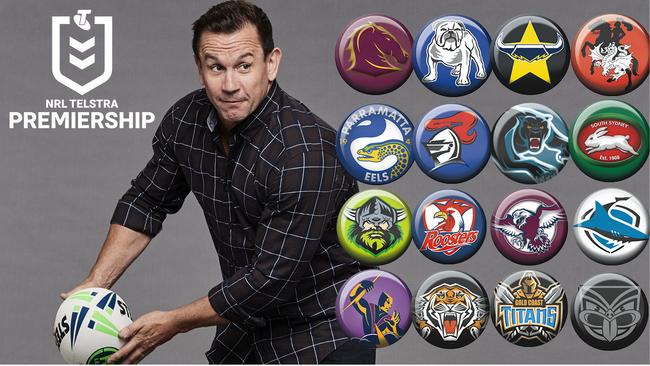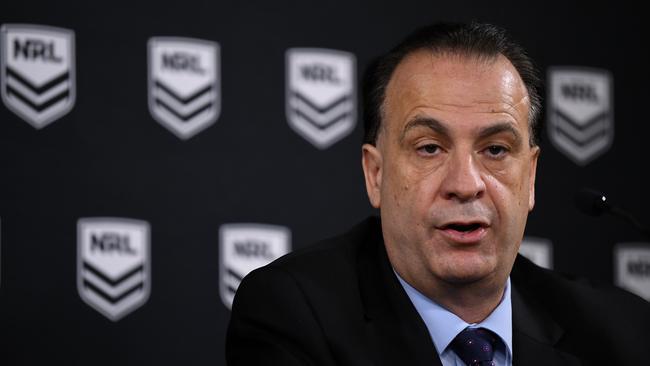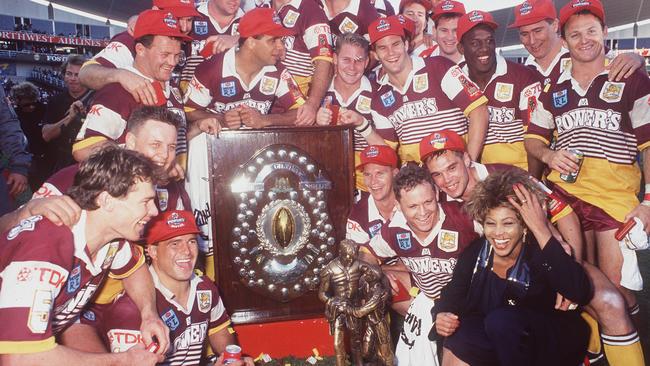Matty Johns: Tribal wars and self-interest threaten NRL’s existence
If the NRL was a country it would be Afghanistan – a mass of 17 warring tribes that includes the governing body, and their self-interest puts us all at risk, writes MATTY JOHNS.

NRL
Don't miss out on the headlines from NRL. Followed categories will be added to My News.
The NRL’s goal is for all 16 clubs to survive.
For that to happen, as a game we’ll need to change old habits dramatically and learn to co-operate with each other.
I explain to people who aren’t familiar with the landscape of rugby league that if the NRL was a country it would be Afghanistan, in that we are a mass of warring tribes.
Sixteen clubs which in the past have been unwilling to row in the same direction.
Relive classic NRL matches from the 60s to today on KAYO SPORTS. New to Kayo? Get your 14-day free trial & start streaming instantly >

But if we are talking about the 16 clubs being separate tribes fighting out of self-interest, the 17th tribe is the NRL administration itself.
For a long time the clubs have had wavering faith and trust in the people running the game.
Some of that is warranted, some of it unfair, but none the less there’s a distinct divide.
At times it’s a case of two steps forward and five steps back.
Take recent events. The arrival of Peter V’landys as Commission chairman and his approach of running the business has given the game real hope of unity.
There’s no better example than how the clubs and players have backed V’landys’ decisions throughout this period of coronavirus.

V’landys hasn’t hid the fact that there will be potentially dramatic cuts to player payments and the playing population have swallowed this bitter pill with class.
But just as we start to get somewhere as far as administration and clubs coming together, V’landys finds another surprise as he pulls the sheets back on the game.
A financial shortfall from the NRL which includes payments to the players’ retirement fund, and the divide widens more than ever.
V’landys’ ability to fix the problems which he has inherited in the NRL’s administration and earn total trust in clubland is crucial in getting all clubs through this challenge.
In isolation with Matty Johns. Don’t miss his latest podcast where Matt is joined by his wife Trish and his two rugby league-playing sons Cooper and Jack.
Subscribe via iTunes or Spotify or listen below!
The power and trust to wield a big stick is vital in V’landys leadership.
Rugby league, you see, operates best in a dictatorship.
If you ask the clubs a question, you’re likely to get 16 different responses.
So best to tell them what to do. To be able to do that you need trust and guts.
I once asked legendary league boss John Quayle how he ran the game and he told me that while there were smart people in the game who he respected and would often ask their opinions, at the end of the day decisions were his and their success or failure decided whether he kept his job or not.

CHECK OUT OUR ‘IN ISOLATION WITH’ SERIES
A day in isolation with Panthers and Blues star Nathan Cleary
NRL 2020 Lockdown: A Day In Isolation with Eddie Blacker
NRL shutdown: In Isolation with Wests Tigers star Alex Twal
Parramatta Eels Ryan Matterson on dealing with life in isolation
When Quayle signed Tina Turner secretly in the lead-up to the 1989 season, word started to get out to the tribes.
The day before the campaign was launched, he received a phone call telling him if the campaign went ahead it would cost him his job. He hung up the phone, launched the campaign and sent rugby league into a golden era.
Club co-operation is historically difficult, hence that big stick V’landys will need in his back pocket.
Some of the stories from the past of club bosses using guile and rat cunning to outdo each other range from the humorous to the frightening.
In the early 1980s there was a can’t miss prospect, who at the time was on an Australian Schoolboys tour of England.
Every club in the league was after him and the figures being thrown his way were climbing day by day.
Finally one powerful club boss made a call to all the others, telling them, “This is getting silly and doing nothing more than putting undue pressure on the kid.”
All club bosses agreed and on suggestion of the peacemaking powerbroker, they all decided to meet at 7pm Friday at NSW Leagues Club to enjoy a Chinese meal and discuss all matters the upcoming season.
And at 7pm that Friday all bosses turned up ... except one.
You guessed it, the powerful club boss by then had flown to Manchester and got the signature of the future Origin star.
Chris Anderson likes to tell a story about Super League.
The split had occurred and all Super league clubs gathered at a location to discuss how their competition would run.

MORE NEWS
Eels great Peter Wynn urges NRL stars to get out and help their local community
NRL 2020: Penrith Panthers to cut teams as financial reality hits hard
Australian cricket contract list 2020-2021 set to be delayed by Coronavirus impact
At the end of the meeting a respected club boss spoke of the importance of all teams being competitive.
He suggested that they all call a truce on trying to sign each other’s players.
All Super League clubs agreed, great call.
The next day that club boss signed one of Anderson’s players.
Like countries, the 16 NRL clubs are far from equal in terms of resources.
Some are geographically blessed, others have strong connections to the big end of town, while yes I know, some clubs are just better run.
But if we are serious about all 16 clubs surviving, one of the first things which needs to be addressed is the current equal funding model.
Getting all clubs to agree to change will be typically challenging.
